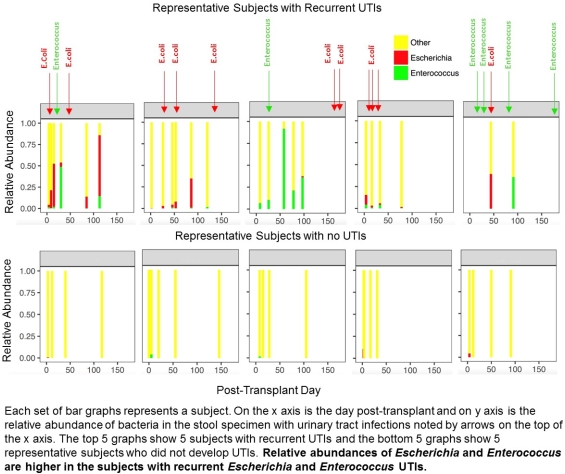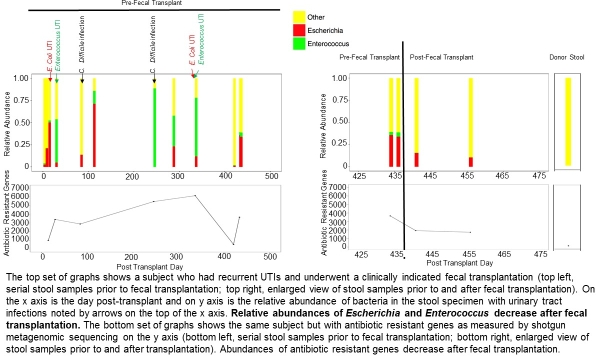Gut Microbiota Dysbiosis is an Independent Risk Factor for Development of Urinary Tract Infections in Kidney Transplantation
1Weill Cornell, NY, NY
2Memorial Sloan Kettering, NY, NY.
Meeting: 2018 American Transplant Congress
Abstract number: 439
Keywords: Infection
Session Information
Session Name: Concurrent Session: Kidney Infectious - Pot-Pourri
Session Type: Concurrent Session
Date: Tuesday, June 5, 2018
Session Time: 2:30pm-4:00pm
 Presentation Time: 2:42pm-2:54pm
Presentation Time: 2:42pm-2:54pm
Location: Room 608/609
INTRODUCTION. We examine the relationship between the gut microbiota and development of Escherichia and Enterococcus urinary tract infections (UTIs).
METHODS. We recruited 170 kidney transplant recipients for serial collection of fecal specimens in the first 3 months of transplantation and profiled the gut microbiota in 566 fecal specimens using 16S rRNA deep sequencing of the V4-V5 hypervariable region. Among these 170 kidney transplant recipients, 33 recipients developed an Escherichia UTI and 137 did not; 33 recipients developed an Enterococcus UTI and 137 did not. Using a time dependent cox regression model, we evaluated whether dominance of Escherichia or Enterococcus in the gut (relative abundance ≥1%) was associated with future development of Escherichia or Enterococcus UTI, respectively.
RESULTS. A gut microbiota profile with greater than 1% relative abundance of Escherichia was associated with future development of Escherichia UTI (Hazard Ratio 4.0, P<0.001), independent of female gender. A gut microbiota profile of greater than 1% relative abundance of Enterococcus was associated with future development of Enterococcus UTI (HR 2.9, P=0.004), independent of female gender. Kidney transplant recipients who developed multiple Enterococcus and Escherichia UTIs had the most disturbed gut dysbiosis. 
One subject with recurrent UTIs underwent a fecal transplantation (FMT). The relative abundances of Enterococcus and Escherichia as well as antibiotic resistant genes decreased after FMT. 
CONCLUSIONS. Our research highlights a gut microbiota-UTI axis and advances strategies for the modulation of the gut microbiota to prevent and/or treat recurrent UTIs.
CITATION INFORMATION: Lee J., Sholi A., Gong C., Magruder M., Albakry S., Edusei E., Botticelli B., Dadhania D., Lubetzky M., Taur Y., Ling L., Pamer E., Suthanthiran M. Gut Microbiota Dysbiosis is an Independent Risk Factor for Development of Urinary Tract Infections in Kidney Transplantation Am J Transplant. 2017;17 (suppl 3).
To cite this abstract in AMA style:
Lee J, Sholi A, Gong C, Magruder M, Albakry S, Edusei E, Botticelli B, Dadhania D, Lubetzky M, Taur Y, Ling L, Pamer E, Suthanthiran M. Gut Microbiota Dysbiosis is an Independent Risk Factor for Development of Urinary Tract Infections in Kidney Transplantation [abstract]. https://atcmeetingabstracts.com/abstract/gut-microbiota-dysbiosis-is-an-independent-risk-factor-for-development-of-urinary-tract-infections-in-kidney-transplantation/. Accessed February 18, 2026.« Back to 2018 American Transplant Congress
